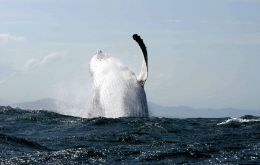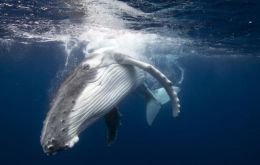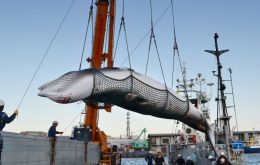MercoPress. South Atlantic News Agency
Tag: whale hunting
-
Friday, October 18th 2019 - 09:29 UTC
Humpback whales in the SW Atlantic total some 25.000, NOAA survey

One of the whale populations taken to the edge of extinction by commercial hunting in the early 20th Century has essentially recovered its numbers. It's estimated the humpbacks that frequent the southwest Atlantic once totaled perhaps 27,000 animals.
-
Monday, June 24th 2019 - 08:38 UTC
How do you like your whale: cutlets, sliced raw, deep fried, bacon or burgers?

Whale cutlets, sliced raw whale, deep-fried whale nuggets, whale bacon and whale jerky feature on the menu at the restaurant Yoko Ichihara runs: and that's just a small sample of the ways Japan eats whale.
-
Wednesday, December 26th 2018 - 08:45 UTC
Japan withdraws from the Whaling Commission to resume commercial hunting

Japan will withdraw from the International Whaling Commission in 2019 to pave the way for the resumption of commercial whaling for the first time in about three decades, the government said on Wednesday, a decision likely to draw international condemnation.
-
Friday, September 14th 2018 - 08:28 UTC
Support for Brazilian proposal to safeguard whales in perpetuity: Japan and allies furious

Tempers flared at the International Whaling Commission (IWC) on Thursday as it voted to back a Brazilian proposal which would safeguard whales in perpetuity, after a bitter debate. The biennial meeting of the 89-nation body passed the host country's “Florianopolis Declaration” which sees whaling as no longer being a necessary economic activity.
-
Thursday, September 13th 2018 - 06:02 UTC
South Atlantic sanctuary for whales will have to wait for another meeting of IWC

An effort to create a safe haven for whales in the South Atlantic was defeated at the meeting of the International Whaling Commission (IWC) in Florianopolis, Brazil. The proposal, which was introduced by Brazil in 2001, received support from 39 countries but was opposed by 25, denying it the three-quarters' majority it needed to pass.
-
Tuesday, September 11th 2018 - 09:06 UTC
Japan insists with a “Sustainable Whaling Committee” to replace moratorium on whale hunting

Pro and anti-whaling nations locked horns on Monday as the International Whaling Commission (IWC) began meeting in Brazil amid outrage over Japan's proposal to end a three-decade moratorium on commercial whale hunting.
-
Tuesday, July 3rd 2018 - 08:49 UTC
Japan wants to change voting rules at IWC to hunt for more whale species

Australia and other anti-whaling nations are seeking a showdown with Japan as Tokyo attempts to resume commercial whaling later this year. Japanese officials have reportedly confirmed the country's attempt to alter voting rules and allow hunting of whale species with “healthy” numbers at an International Whaling Commission (IWC) meeting in Brazil in September.
-
Tuesday, March 5th 2013 - 04:47 UTC
Each annual Antarctic whaling season costs Japanese taxpayers 10 million dollars, says IFAW

Japan’s declining appetite for whale meat is nothing new; but is the country also losing patience with its whaling industry? The answer apparently is yes, according to a new report that highlights the huge cost to the Japanese taxpayer of sustaining its whaling fleet. Without government subsidies, the industry would collapse, it said.
-
Wednesday, July 4th 2012 - 22:13 UTC
South Korea announces plans to start whaling for “scientific research”

South Korea said on Wednesday that it planned to start whaling through a loophole that allows the killing of whales for scientific research, following the lead of Japan's controversial expeditions.
-
Thursday, October 6th 2011 - 18:04 UTC
Dangerous skirmishes anticipated when Japan begins Antarctica whaling season

New Zealand joined Australia in criticizing Japan’s decision to resume whaling in Antarctic waters later this year and Tokyo's announcement that it will increase security for its whaling fleet.
